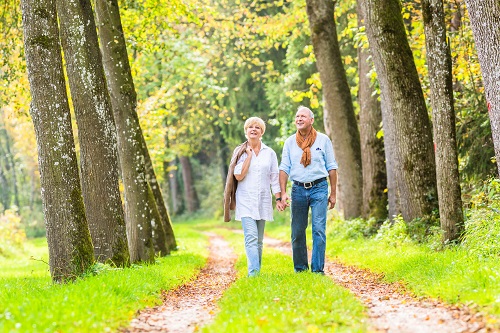What is a 20-minute walk in the outdoors?
In times of ever-increasing environmental pollution and global warming, there is now another reason our planet and its natural to protect more. Researchers found that a daily 20-minute walk in nature, greatly boosts the well-being and Stress were drastically reduced.
In a recent study by the University of Michigan, it was found that already is a daily 20-minute walk in the outdoors for our mental health be of great advantage. The results of the study were published in the English journal “Frontiers in Psychology”.

20 to 30 minutes in nature can reduce Cortisol by about 10 percent
When people stop on a daily basis about 20 to 30 minutes in nature, this leads to the stress hormone Cortisol is reduced by about 10 percent. After 30 minutes, the benefits of well-being increased in the Free, but with a greatly reduced Rate. The results of the study show that The greatest positive impact in terms of an efficient reduction of the levels of the stress hormone Cortisol, if you replace 30 minutes of time, which you spend in a Sitting position, by a 30 minutes long walk in the nature. For this you must, however, not in the deepest Wilderness travel, it is sufficient, for example, to leave the office building and walk through the Park with trees. The results speak, for example, should be spent in case of anxiety more time in the countryside.
Time in nature also helps with high blood pressure
Time in nature helps but only against Stress. If people have diseases such as high blood pressure and mental health problems, has already been advised earlier, that people spend more time in nature. If you prefer looking for a tasty way to reduce high blood pressure, but could also use dark chocolate. Another study has recently shown that daily recorded dark chocolate can lower blood pressure within just a month.
The exact duration and intensity of the walks that are required in order to influence the well-being, have been explored only little. As a so-called non-medical treatments that have a positive impact on the health, they are, however, a Central component of the long-term Plan of the National Health Service, the national health system in great Britain and Northern Ireland, which provides a more than 1,000 specially trained advisors, to help patients to lead a healthier life. It is expected that such a consultation in the next five years, more than 2.5 million people will benefit.
Less drugs and more social activities
In the future, less drug should be prescribed, and for more social activities to be carried out, in order to improve the health of the people in the long term. For example, people with dementia should be offered music and dance therapy, so that they can better deal with your condition. (as)
